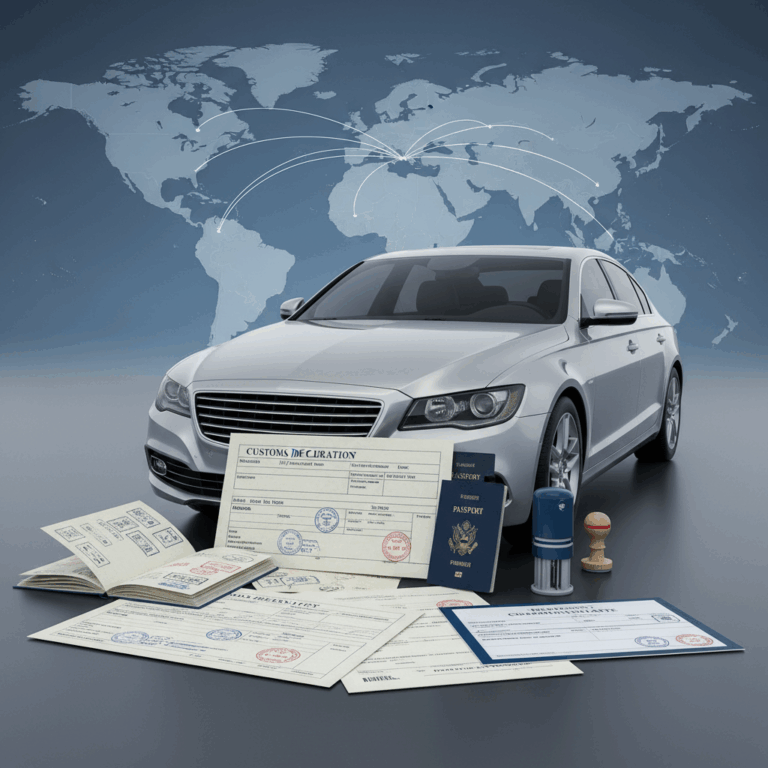Key Documents for Exporting Cars
Exporting a car involves essential documents to comply with international regulations. These documents ensure the vehicle meets safety and legal standards abroad.
Proper documentation prevents delays and legal issues during export. Understanding which documents are required is key for a smooth export process.
From certificates to tax records, exporters must gather specific papers related to the vehicle and comply with local and international rules.
Certificate of Conformity and Vehicle Registration
The Certificate of Conformity (COC) confirms the vehicle meets European technical standards. It is mandatory for car exports from many countries.
Vehicle registration documents, such as the circulation permit, verify ownership and registration details. These must be up to date before export.
Having both the COC and current registration ensures the vehicle is legally exportable and accepted by the destination country’s authorities.
Additional Required Documents and Tax Compliance
Additional documents include the technical inspection card and the sales contract, proving the transaction and condition of the vehicle.
Tax compliance is vital; exporters must confirm that the Vehicle Tax (such as the local mechanical traction tax) is fully paid to avoid penalties.
Ensuring all documents and taxes are in order guarantees a hassle-free export and adherence to both national and international regulations.
Requirements for Importing Cars into Spain
Importing a car into Spain requires several key documents to comply with Spanish and EU regulations. These ensure the vehicle meets safety and emission standards.
Proper documentation streamlines customs clearance and legal registration processes. Understanding Spain’s import requirements is crucial for a successful import.
Documents include conformity certificates, purchase contracts, and proof of compliance with EU standards, which vary depending on the vehicle’s origin.
European Certificate of Conformity and Purchase Contracts
The European Certificate of Conformity (COC) confirms the vehicle complies with EU safety and environmental regulations. It is essential for vehicles from EU countries.
The purchase contract or invoice verifies ownership transfer and the legitimacy of the sale. This document is mandatory for customs and registration.
Together, the COC and purchase contract facilitate smooth vehicle approval and registration within Spain’s automotive system.
Temporary Plates and Compliance with EU Standards
Temporary plates may be needed for transporting the vehicle within Spain or the EU before final registration, especially for newly imported cars.
Vehicles must meet EU standards for emissions and safety before being granted permanent registration, ensuring environmental and road safety compliance.
Failure to meet these standards can delay the import process and might require modifications or additional inspections.
Documentation Differences for Imports Outside the EU
For vehicles imported from non-EU countries, additional documentation like a reduced data sheet or special conformity certificates may be required.
Customs declarations and tax compliance with Spanish regulations are more complex, often involving import duties and VAT payments upon arrival.
Consulting with Spanish customs authorities or a tax agency is recommended to ensure all specific import requirements are fulfilled.
Compliance and Regulatory Considerations
Compliance with emission and safety standards is crucial when importing cars into the EU. These standards protect the environment and ensure vehicle safety.
Regulatory considerations also involve adhering to customs procedures and paying applicable taxes. Failure to comply can result in penalties or import delays.
Understanding these rules helps importers avoid costly mistakes and ensures vehicles meet all legal prerequisites before entry.
Emission and Safety Standards in the EU
The EU enforces strict emission limits for imported vehicles to reduce pollution. Cars must meet these standards to be eligible for registration.
Safety requirements include crash tests, seatbelt adherence, and electronic stability controls. Compliance is verified through conformity certificates.
Non-compliant vehicles might need modifications or face denial of import approval, emphasizing the importance of meeting EU criteria upfront.
Customs and Tax Procedures
Importing a car involves customs declarations where vehicles are inspected, and duties or taxes such as VAT are calculated and paid.
Importers must submit proper documentation, including purchase invoices and certificates of conformity, to facilitate smooth customs clearance.
Consulting local tax authorities or customs agents can help ensure compliance with complex tax obligations and avoid costly delays.
Variations Based on Origin and Destination
Importing or exporting cars involves varied documentation depending on the origin and destination countries. Understanding these differences is vital for compliance.
Vehicles moving between EU countries benefit from streamlined procedures, while imports and exports involving non-EU countries require additional certificates and taxes.
Each scenario demands specific documentation to meet local regulations and international standards, ensuring smooth vehicle transit across borders.
Importing from EU Countries vs Non-EU Countries
Importing cars from EU countries typically requires a European Certificate of Conformity (COC) and purchase contracts for proof of compliance and ownership.
Non-EU imports, however, need extra paperwork such as reduced data sheets and must comply with customs duties, VAT, and more rigorous inspections.
Temporary plates might be allowed for EU imports but usually require extra approval or documentation for cars imported from outside the EU.
It is important to verify emission and safety standards applicable to the vehicle depending on its origin to avoid regulatory issues.
Export Documentation Specifics by Country
Export documentation varies based on the destination country’s legal requirements. Some countries require strict certification while others have simpler rules.
For example, exporting cars from Spain needs a COC, vehicle registration, and payment proof of vehicle taxes. Other countries may require additional customs clearance forms.
Understanding each country’s import prerequisites helps exporters prepare complete documentation, reducing delays and customs complications.
Interesting Fact
Some countries have bilateral agreements that simplify export-import processes, minimizing paperwork and tax burdens for vehicles moving between them.
This cooperation fosters faster trade and smoother vehicle registration across borders, benefiting both exporters and importers.







